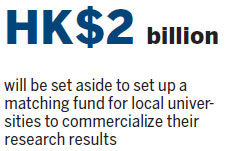CE's innovation drive widely praised
Updated: 2016-01-14 07:03
By Emma Dai in Hong Kong(HK Edition)
|
|||||||||
Hong Kong academics, businessmen and industrialists applauded the government's efforts to support local innovative and entrepreneurial forces. The new matching fund and more affordable spaces are expected to stimulate startup culture and make the SAR a center for venture capital.
"The Hong Kong government will secure enough funding to support research and development (R&D) activities in local universities," Chief Executive Leung Chun-ying said at the Wednesday afternoon press briefing.
"Our only concern is whether the academics could go beyond essays and convert more of their fundamental research into applicable techniques," he added.
The 2016 Policy Address, included the announcement of HK$2 billion for the Innovation and Technology Bureau to set up a matching fund for local universities to commercialize their research results.
Wong Kam-fai, director of the Centre for Innovation and Technology at the Chinese University of Hong Kong, believes the government fund is to motivate private investment into local startups, as the fund is to invest HK$1 for every HK$2 input by the private sector.
"That's HK$2 investment for a HK$3 result. It's a considerable incentive to drive more foreign and mainland venture capitalists to look into what Hong Kong has to offer," Wong said.
"As momentum builds up, more talents will join in. It will make Hong Kong an innovation hub and a venture capital center as well," Wong added.

David Lynch, head of technology and operations at DBS Bank (Hong Kong), said the fund would make the SAR more attractive, if the matching-investment process was managed efficiently.
"Better access to capital is critical to establish Hong Kong's position as a FinTech (financial technology) leader," Lynch said. "There are well-established private sector players in the market who are capable in due diligence and investment screening, to increase the likelihood of successful returns from the fund."
But for venture capital, a harder part is to find suitable projects, said Nisa Leung, convener of Venture Investors Alliance of Hong Kong. "Apart from following capitalists' initiatives, the government could also guide R&D activities to what Hong Kong's good at and point investors to these areas as well."
She said local startups also needed to improve their understanding of the mainland and US markets, to win the favor of venture capitalists.
Meanwhile, to lower entrance barriers for tech startups and nurture value-added manufacturers, more affordable space was also proposed.
Hong Kong Science Park is to boost its gross floor area to 330,000 square meters in 2016, to meet the demand in the next two to three years. Cyberport will extend its incubation scheme and set up new clusters for FinTech and e-commerce sectors, and 50 percent more small offices will also be available at Cyberport.
"It's good to see government trying to boost the local innovation community and value-added manufacturing with more land and more funds," said Daniel Cheng, chairman of the Federation of Hong Kong Industries.
"Manufacturing and innovation are due to grow together. Hong Kong has talents. With pressure to move up the value chain, we are eager to see more local research results being converted into matured technologies and applicable techniques," Cheng added.
(HK Edition 01/14/2016 page2)